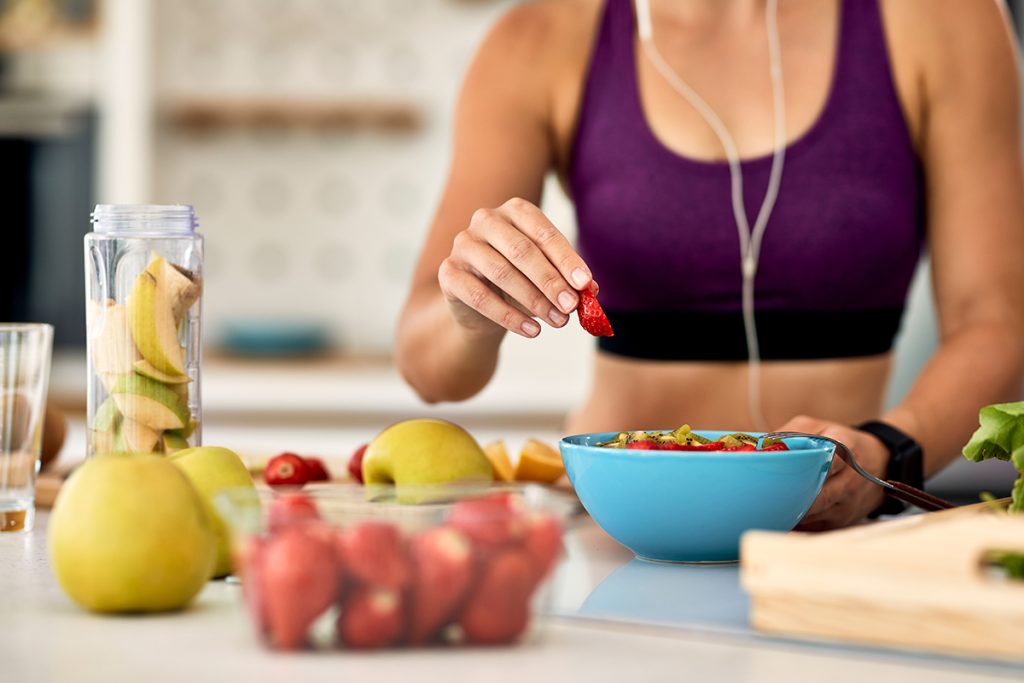How to get the proper nutrition when exercising

For athletes, nutrition serves primarily two essential purposes: providing energy and facilitating body recovery. Achieving peak performance and timely recovery rely on having the right nutrition. Inadequate intake of proteins, carbohydrates, fats, vitamins, and minerals not only hinders goal attainment but also heightens the risk of injuries.
How critical is proper nutrition for athletes?
Nutrition holds significance for athletes across the spectrum, from amateurs to professionals, with its importance becoming increasingly evident at higher levels of competition. Furthermore, the impact of nutrition varies depending on the type of sport undertaken, distinguishing between tactical sports and purely physical sports.

Tactical sports
In tactical sports like volleyball, nutrition assumes a slightly less pivotal role. Despite being physically demanding, compensating for energy deficits is feasible through exceptional technique or a well-executed tactical strategy.
Physical sports
Conversely, in physical sports such as athletics, fitness, and cycling, technique and tactics play a lesser role. These sports rely predominantly on physical performance, where nutrition becomes a critical determinant of success.

The role of nutrition in sports, health, and weight management
The significance of nutrition isn’t solely determined by the type of sport you engage in but also by your objectives. If your physical activity is primarily for enjoyment, nutrition may not be a decisive factor. However, if your exercise routine is focused on improving your health and managing your weight, then nutrition takes on a more prominent role than the exercise itself!
When aiming to shed pounds, the most effective approach is a combination of regular exercise and a balanced diet. While it’s possible to lose weight without exercise, achieving weight loss without the right dietary choices is considerably more challenging. On the flip side, if your goal is to build muscle mass, exercise must be coupled with appropriate nutrition.

What constitutes an ideal diet for athletes?
For athletes, the optimal diet is consistently a healthy one. Preparing your meals at home whenever possible allows for a more natural and nutritious diet, as home-cooked, fresh meals tend to offer a richer array of essential nutrients compared to processed options.
Furthermore, it’s essential to align your macronutrient intake (proteins, carbohydrates, and fats) with your level of physical activity, the type of exercise you engage in, and your specific fitness objectives.
What is the best sports diet?
If you aim to maximize your performance in sports, paying attention to your dietary choices is paramount. Both fats and carbohydrates serve as essential sources of fuel during exercise, while proteins play a vital role in muscle building and repair.
However, the specific sports diet to follow depends on the nature of your chosen sport and your desired objectives. The foundation of a sports nutrition plan, much like other dietary plans, should prioritize overall health. You don’t need to focus on elaborate culinary creations; instead, simple, wholesome, and enjoyable recipes suffice.
Beyond health considerations, the composition of macronutrients takes center stage, with the precise ratio contingent upon the type of sport you engage in.

The ideal diet for endurance sports
Endurance athletes expend substantial energy, primarily in the form of fats and carbohydrates. Maintaining an adequate fat intake typically occurs effortlessly and almost naturally. Therefore, the primary focus for endurance athletes lies in ensuring an ample carbohydrate intake. Foods such as potatoes, bread, oatmeal, pasta, and fruits are prevalent sources of carbohydrates in their diets.
Endurance athletes do not have an exceptionally high protein requirement, and when consuming foods like potatoes, they naturally acquire additional proteins. Consequently, this aspect of nutrition is usually not a challenge for them.
Hence, the best diet for endurance sports typically entails a standard dietary regimen bolstered by additional carbohydrates.

The ideal diet for strength sports
Strength athletes deliberately strain their muscles during workouts. By consuming sufficient proteins, the body repairs and enhances these muscles. Therefore, for these athletes, obtaining an adequate protein intake is absolutely crucial.
To foster muscle growth, a strength athlete should also match their calorie intake to their energy demands. This entails initially incorporating ample proteins and fats into their sports nutrition plan, followed by supplementing these with carbohydrates until their daily energy requirements are met.
Dietary considerations for male athletes
Men typically exhibit greater body weight and a higher proportion of muscle mass compared to women. With a larger engine demanding more energy, men often require a higher caloric intake to achieve similar performance levels. Additionally, due to their increased muscle mass, men generally need a higher proportion of protein to sustain and support their muscles.

Dietary considerations for female athletes
Women who engage in physical activity must be attentive to their hormonal balance. Excessive exercise without proper attention to diet can lead to irregular menstruation or even its cessation. In extreme cases, the body signals distress and the need for more rest and energy.
Therefore, it is crucial to incorporate adequate rest periods into your routine, especially when pursuing weight loss. Achieving weight loss requires maintaining a calorie deficit, but it should not be pursued excessively. It is advisable to lose weight gradually, keeping long-term goals in mind. Remember, each person is unique, so always listen to your body’s individual needs and signals.



















